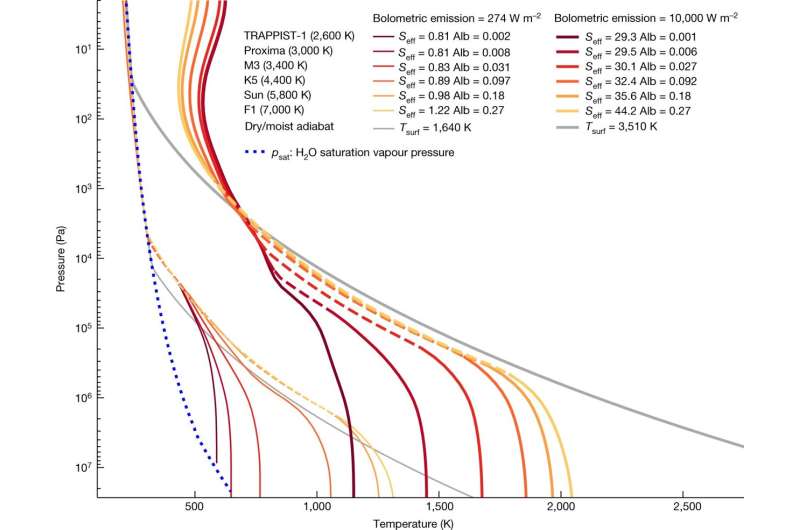August 15, 2023 report
New study suggests some exoplanets orbiting red dwarfs may be habitable after all

Bob Yirka
news contributor

A team of astrophysicists from the University of Bordeaux and Observatoire Astronomique de l'Université de Genève is suggesting that some exoplanets may not have been too hot during their formative years to harbor life today. In their paper published in the journal Nature, the group suggests that due to factors not considered in the past, some exoplanets may not have grown so hot that they lost the water in their atmospheres to evaporation into space.
Current theory suggests that most exoplanets orbiting close to red dwarfs (and some other stars) are unlikely to harbor life. This, the theory also suggests, is because during their early years, when their star was hotter, water released from rocks on the exoplanetary surface would have evaporated into their atmosphere.
But unlike more habitable planets, where the water in the atmosphere would cool, condense and form oceans, the water would evaporate and dissipate into space, making the planet too dry to support life. In this new effort, the research team questioned these current theories and developed one of their own that reconsiders the state of many exoplanets now thought to be too dry to host life.
In the new theory, some planets closely orbiting a red dwarf (such as the Trappist-1 star) would not necessarily have grown as hot as previous theories suggest, which means that during their formative years, water could have been retained in the crust. That water, they further suggest, could then be released into the atmosphere by volcanic activity—later, as the planet cooled, it would have condensed to form oceans.
The reason the planet would not be as hot as prior theories have suggested, is because of heat radiation, which is not accounted for in prior theories. Adding the effects of radiation, they note, would also shorten the time during which the exoplanet would be hot enough to melt rocks in the crust, increasing the odds of some of it retaining water.
The research team suggests that if their new theory holds up, some work regarding planet formation may have to be revisited, such as theories of the evolution of Venus. It could also rule back in some exoplanets that have been ruled out as possible harbors of life.
Written for you by our author —this article is the result of careful human work. We rely on readers like you to keep independent science journalism alive. If this reporting matters to you, please consider a (especially monthly). You'll get an ad-free account as a thank-you.
More information: Franck Selsis et al, A cool runaway greenhouse without surface magma ocean, Nature (2023).
Journal information: Nature
© 2023 Science X Network





















